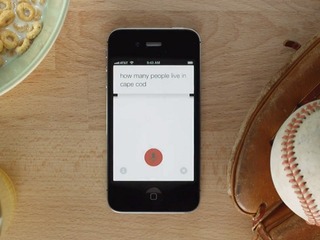New disease models unlocking secrets to neurological research
Advances in technology, like in vitro and microfluidics, have helped advance research
Read more...
My current phone is an iPhone 4, so I still have not had the distinct pleasure of being introduced to voice assistant Siri. We only know each other through reputation, and hers, honestly, isn't that great. Still, plenty of people use the service, and Apple was always a pretty cagey about what exactly happened to the data it was collecting from those searches.
For whatever reason, Apple has finally decided to spill the beans. A day after Wired wrote an article in which it noted that the ACLU was raising some concerns over Siri's privacy policy, Apple came out and revealed to the website exactly what happens to that data.
Whenever a user makes a request to Siri, that data is sent to Apple's data farm to be analyzed. It keeps the data anonymous by generating a random number. The recording will be associated with that number for six months, after which Apple disassociates the file from the number. The number gets deleted, but the voice file is kept for another 18 months, to help Apple refine and test Siri.
That means that Siri voice files are kept for two years. If a user decides to turn Siri off, though, all the identifiers, and the data, will be automatically deleted.
While this disclosure is a step in the right direction, the ACLU is still unsatisfied. Their initial concern over the matter came from a section of the Siri Privacy policy, which reads, “Older voice input data that has been disassociated from you may be retained for a period of time to generally improve Siri and other Apple products and services."
ACLU lawyer Nicole Ozer told Wired that she would like to see Apple put that Privacy policy directly on its Siri FAQ in order to give the customer as much information as possible before they buy a new Apple product, or decide to use Siri. Indeed, most users probably never even realized that their voice searches were being kept by Apple at all, let alone for two years. Nor did they know that they had any way of stopping Apple from harvesting that data.
Of course, the Siri Privacy policy is not being kept secret or anything. It can be found within the Siri Settings section of an iPad or iPhone, but I'm sure few people realized that either.
Siri was initially released in October 2011, and was first supported on the iPhone 4S after being purchased by Apple in April 2010. It was then added to the third generation iPad with the release of iOS 6, and is included on the iPhone 5, fifth generation iPod Touch, fourth generation iPad and the iPad mini.
The service has not been without its share of controversy before.
Five months after Siri was released, a poll taken by Parks Associates showed that only 55% of people who used the service were happy with it. What that was still much higher than the 9% who said they were dissatisfied, but it also left a lot of people who, frankly, seemed unimpressed with the virtual assistant.
The survey also found that 87% of people have used Siri in some capacity, most of them only used it for basic functions, like phone calls and text messages, while neglecting the other features that come along with the service.
Then, in June of 2012, a man named Frank Fazio sued Apple, claiming that Apple had engaged with false advertising when it came to Siri. The lawsuit contended that Siri did not perform as advertised and, therefore, the iPhone 4S is the same thing as the iPhone 4, only more expensive.
Apple could not be reached for further comment, and we will update if we hear anything further.
(Image source: https://www.wired.com)
Advances in technology, like in vitro and microfluidics, have helped advance research
Read more...Robots are taking over the heavy lifting work inside warehouses
Read more...The company also expanded access to 12 different provider types for male fertility care
Read more...Startup/Business
Joined Vator on
Siri is a Virtual Personal Assistant - a new way to interact with the Internet on your mobile phone. Like a real assistant, Siri helps you get things done. You interact with Siri by just saying, in your own words, what you want to do. You can ask Siri to find a romantic place for dinner, and get reservations for Saturday night. You can discover things to do over the weekend, get tickets to the movies, or call a cab when you’re out on the town. You don't have to search through a bunch of web pages, following links and hunting down facts. Siri does all the work giving you the information you need at your fingertips.
We believe that in five years most people who use the Internet will have a Virtual Personal Assistant (VPA) to take care of the details of using online services. We will look back at the birth of VPAs in 2009 and wonder how we ever got by without our trusted assistant. The days of wading through links and pages from your mobile interface will seem quaint, because the natural way to interact with the rich world of information and services is to have a conversation. As John Batelle, the author of The Search, says "The future of search is a conversation with someone we trust."

